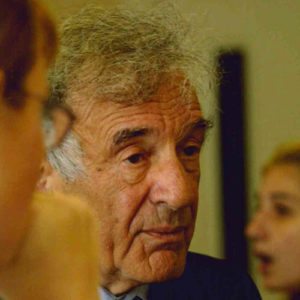A man of soft-spoken words with tremendous power, Dr. Elie Wiesel was an inspiration of a lifetime. As a student, I had the special opportunity of meeting and chatting with him over the course of a few weeks in January of 2014. It was my first time meeting Dr. Wiesel in person, yet he had already become my teacher long before and will remain so for years to come.
Wiesel first impacted my life during a time of vulnerability and uncertainty as I began to question my place in this world and what it all meant between my junior year of high school and my first years of college. I had been struggling to reconcile my faith since about 14 years old when I renounced my Catholic religion. Yet religious topics aside, the concept that troubled me most about faith was that, somehow, everything in our lives supposedly followed a purpose and a destination—a cruel joke in a world where terrible things appear to happen without purpose. The internal struggle began to consume me in my personal life, and I began to see the world through a lens of cynicism. Even as I watched news coverage depicting each week’s heroic acts, as I volunteered, as I traveled and as I tried to immerse myself in the blissful feeling of instant reward produced by partying, trying new hobbies, fitness and surrounding myself with friends, the question haunted me. In fact, it grew as I discovered ugly realities among things I had idealized as I looked toward my next options after high school. For example, I turned my back to the military for this very reason.
During this period, I also had my first opportunity to learn in depth about history’s darkest moments and witnessed how atrocities of the past repeat themselves despite promises of “never again.” I often questioned whether any of it mattered. During this period, I took several classes that discussed one of the darkest of such events: the Holocaust. There, I also had my first opportunity to learn from Dr. Wiesel—first, during my junior year of high school, then during Western Heritage as a freshman at Eckerd, as I was assigned to read his memoir Night. Wiesel’s accounts of horror shocked and saddened me as I followed his journey through unthinkable atrocities. I was especially haunted by their apparent meaninglessness. I identified with his struggle with faith in his search for impossible answers as he fought for his life in the camps. I hung on his every word as I was reminded of my own feelings of loss and confusion throughout my life.
Yet what struck me most about Wiesel’s story wasn’t the darkness but his incredible ability to overcome it all and to defy despair. In this, Dr. Wiesel helped me acknowledge that many questions go unanswered in life, no matter how burning the matter or how unintelligible the injustice. I found solace in his journey as it pressed me to acknowledge the unmountable stumbling block: Living in a world commandeered by humans subjects us to both the good and the atrocious extremes of human nature—the likes of which we will likely never truly understand. In the end, this meant that awful things do happen for no good reason. This said, Wiesel taught me an incredibly important lesson: There is always something we can do. He taught me our greatest strength lies in our ability to take action. Even in the darkest moments, Wiesel held on to any opportunity he had to push forward even as he struggled to hold on to life. Through this, he survived; and as I would come to see during Winter Term of 2014, he turned his experience into an opportunity to thrive.
I was humbled by the grace with which Dr. Wiesel carried himself, not only in the classroom but throughout his life. As I learned by reading the extensions of his biography, Dawn and Day, Wiesel’s hardships hardly ended after the Second World War. As if surviving the Holocaust weren’t enough of a feat, a lost family, poverty, statelessness and even open-heart surgery at the age of 82 did not stop this man. As a matter of fact, each mountain climbed appeared to grant Dr. Wiesel more strength, triumph and notoriety. Needless to say, I felt honored—and perhaps a little intimidated—each and every day I had the opportunity to sit in that classroom with him.
I often still find myself thinking back to the opportunity and thinking about how lucky I was to have met such a person. Yet, what I enjoyed most about Dr. Wiesel during the class was his stark yet comforting humanity. Wiesel always brought a smile to my face as he joked and laughed about some of the stranger memories from his life, often wandering off on a tangent about a crazy experience he and one of his many friends from throughout the decades embarked upon. He always offered his most honest thoughts and never shied from revealing his vulnerabilities and inviting us to open up as well. Every day, I walked away feeling like I’d just enjoyed a deep discussion with an old friend or a family member. Wiesel’s deep and colorful humanity ultimately inspired me as it so clearly persevered throughout all aspects of his life, tragedy and triumph alike. He always remained true to himself. In this, he acted as a testament to the wonders of the human soul. As I move on to the next stages of my life, I hope to always take with me Dr. Wiesel’s incredible ability to feel deeply yet remain strong and loving in this unpredictable and wild world. I feel deeply blessed to have been touched by this incredible man’s legacy and I am fortunate to have made such a wonderful friend.
—Federica Brandi ’16


